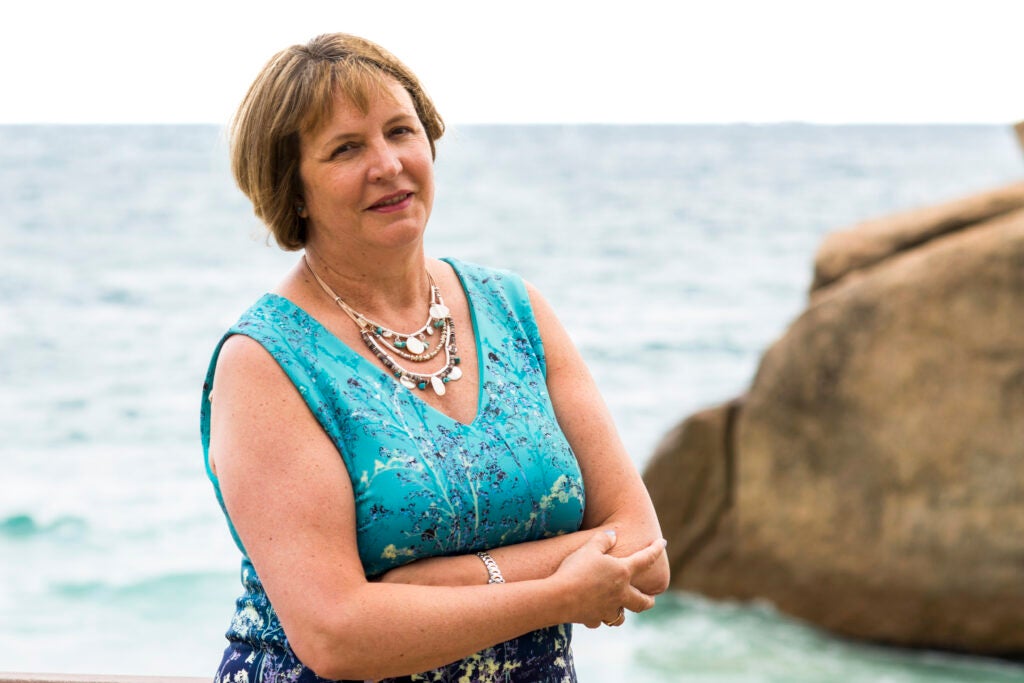November 4, 2024
Supporter Spotlight: Heather Stevens, Ensuring the Future of Ocean Livelihoods
BY: Sarah Holcomb
In 2007, Heather Stevens learned that the oceans were in trouble due to increasing threats like overfishing and climate change. Stevens, who grew up by the sea in the United Kingdom, asked around to find an effective organization making a real difference for the oceans. One name kept coming up: Oceana.

Since then, Stevens has not only supported Oceana’s campaigns through her grant-making foundation — The Waterloo Foundation — she also joined the organization’s Board of Directors. Throughout her decade on Oceana’s Board, Stevens, an insurance expert who cofounded the highly successful Admiral Group company, brought unique insights from her insurance background to ocean conservation.
“I brought together my own work knowledge from the world of car insurance with what I knew was essential for all fishers, good or bad: insuring their boats,” Stevens says. She wondered, “Could we use the pressure from the insurance world to deprive bad actors of the cover they use for their illegal fishing operations?”
The answer, Oceana discovered, was yes. In 2021 and 2022, two major insurance companies took actions to improve screening and make it harder for illegal fishing operators to be insured, thanks to Oceana’s campaigning. A Norwegian-based insurance company ended its contract with a fleet of vessels that were listed by the International Commission for the Conservation of Atlantic Tunas for illegally fishing across the Atlantic.
“A whole world of insurers became informed and took action because of Oceana’s campaigns,” Stevens remembers.
When Stevens saw an early prototype of what would become Global Fishing Watch — an open-access platform developed by Oceana, SkyTruth, and Google to make fishing data available to the public — she immediately recognized its potential.
“Here was a chance to curtail illegal fishing simply by making it visible to all,” Stevens says. “There was an obvious parallel with motorists slowing down for speed cameras! I was so pleased to be able to make an early grant for Global Fishing Watch.”
Today, Global Fishing Watch has used satellite technology and machine learning to identify countless hotspots of illegal fishing and provide governments with the data they need to hold illegal fishers accountable.
Stevens has long been concerned with stopping illegal fishing wherever it happens. When it involves foreign vessels, often local artisanal fishers are especially impacted, she says. “Their livelihoods are literally being stolen from their own waters,” she explains. “Recently I learned how foreign fishing can often mean that local families and communities are not only being deprived of income, but also of an important source of protein and nutrition.”
“As our population grows, the pressure on the oceans from large and sophisticated industrial fishing vessels will continue to grow. Humanity will continue to need the protein and micronutrients that the marine food web provides,” Stevens says. “It is so important that the distribution of this key food source is equitable.”
In countries like Senegal, where over 50% of the population lives along the coast, many depend on fishing for food and livelihoods. “I felt Oceana has the power to make a real difference there, so I was happy to offer the first support to setting up an office in Senegal,” says Stevens.
As Oceana looks to partner with local communities in the fight to preserve fishers’ livelihoods and hold illegal operators and foreign industrial fleets accountable, Stevens is confident that future campaigns in Senegal and beyond will achieve results.
“I’ve met all of Oceana’s country leaders over the years, and each is so strong in their own right — with great depth of knowledge, and campaign political experience. They know how to get things done.”



